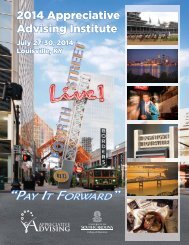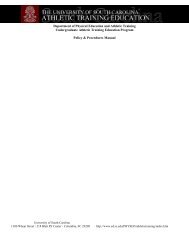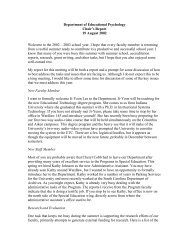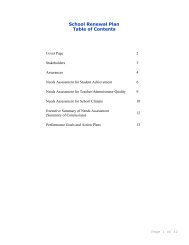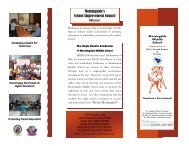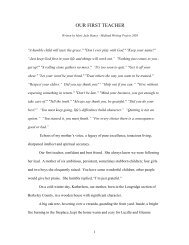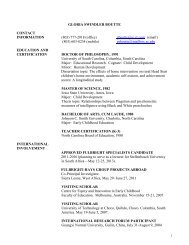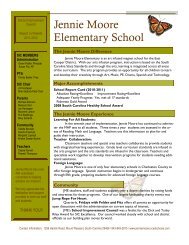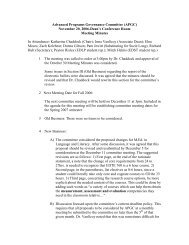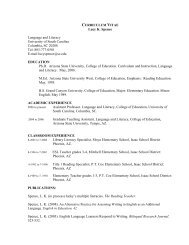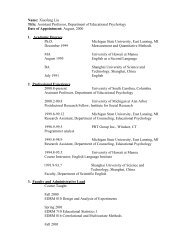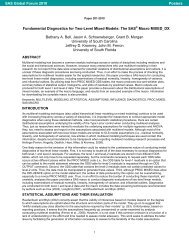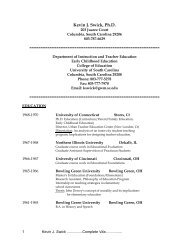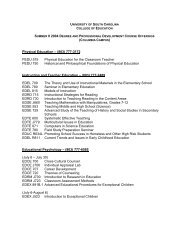EDHE 832 (Special Topics) Higher Education in Fiction & Film
EDHE 832 (Special Topics) Higher Education in Fiction & Film
EDHE 832 (Special Topics) Higher Education in Fiction & Film
You also want an ePaper? Increase the reach of your titles
YUMPU automatically turns print PDFs into web optimized ePapers that Google loves.
University of South Carol<strong>in</strong>a<br />
College of <strong>Education</strong><br />
Department of <strong>Education</strong>al Leadership and Policies<br />
<strong>EDHE</strong> <strong>832</strong> (<strong>Special</strong> <strong>Topics</strong>)<br />
<strong>Higher</strong> <strong>Education</strong> <strong>in</strong> <strong>Fiction</strong> & <strong>Film</strong><br />
Summer I Semester 2009 (June 1 – July 2)<br />
Instructors: Christian K. Anderson & Barbara Tobolowsky<br />
Anderson: 312 Wardlaw College<br />
(803) 777-6702<br />
christian@sc.edu<br />
Class time: Tues. & Thurs.,<br />
4:30 – 8:00 p.m.<br />
Course Description<br />
Tobolowsky: 1728 College Street<br />
(803) 777-5193<br />
BarbaraT@mailbox.sc.edu<br />
Classroom: 122 Wardlaw College<br />
The purpose of this course is to <strong>in</strong>troduce students to how higher education is portrayed<br />
<strong>in</strong> fiction and film and to exam<strong>in</strong>e what that means to higher education.<br />
We will ask question such as: What do these representations of campus life and culture<br />
mean to the study of higher education? How accurate are fictional portrayals of colleges,<br />
universities, faculty, and students? (And what does it mean if they are accurate—or not?)<br />
What can we learn about colleges and universities, and students and faculty through<br />
fiction and film?<br />
Of course, we’ll also have fun look<strong>in</strong>g (and laugh<strong>in</strong>g) at depictions of higher education.<br />
Course Requirements and Expectations<br />
• Students are expected to act professionally and ethically <strong>in</strong> the class and <strong>in</strong><br />
complet<strong>in</strong>g their assignments.<br />
• Students are expected to attend, participate fully <strong>in</strong> discussions, and submit work<br />
on time.<br />
• Please refer to the University’s Academic Calendars at http://registrar.sc.edu/ for<br />
deadl<strong>in</strong>es and other important University-wide dates.<br />
<strong>EDHE</strong> <strong>832</strong> – <strong>Fiction</strong> & <strong>Film</strong> (Revised 4/28/09) Summer 2009, p. 1
Required Read<strong>in</strong>g<br />
Required texts are available at the University Bookstore and through onl<strong>in</strong>e stores:<br />
Grad<strong>in</strong>g<br />
Chang<strong>in</strong>g Places by David Lodge.<br />
I’ll Take You There by Joyce Carol Oates.<br />
Stoner by John Williams.<br />
Boggs, J.M. & Petrie, D.W. (2004). The Art of Watch<strong>in</strong>g <strong>Film</strong>s (6 th ed or 7 th ed).<br />
New York: McGraw Hill.<br />
A Course Reader, available at Universal Copy (on Ma<strong>in</strong> Street).<br />
<strong>Film</strong>s will be viewed <strong>in</strong> class and do not need to be purchased.<br />
You will be graded on your performance on the required assignments and class<br />
participation based on the follow<strong>in</strong>g scale:<br />
Course Assignments<br />
Letter Percentage<br />
Grade<br />
A 92 – 100%<br />
B+ 87 – 91%<br />
B 80 – 86%<br />
C+ 76 – 79%<br />
C 70 – 75%<br />
D+ 65 – 69%<br />
D 60 – 64%<br />
1. Book or <strong>Film</strong> Review: Choose an example of fiction or film, published or produced<br />
s<strong>in</strong>ce 2000, and write a review of 1,000—1,500 words. Write your review as if you were<br />
writ<strong>in</strong>g it for the New York Times Book Review or Variety (for film reviews) or a similar<br />
publication. Be sure to <strong>in</strong>clude <strong>in</strong> your review a discussion of what the book or film tells<br />
a general audience about higher education. If possible, identify how this book or film is<br />
different from or similar to academic fiction/films from previous eras. Lists of novels<br />
and films are available on Blackboard. Please submit your title to the <strong>in</strong>structors as<br />
early as possible but no later than June 9 th ; preferably no two students will review the<br />
<strong>EDHE</strong> <strong>832</strong> – <strong>Fiction</strong> & <strong>Film</strong> (Revised 4/28/09) Summer 2009, p. 2
same book or film. Reviews are due on June 23 rd and will be discussed <strong>in</strong> class on June<br />
25 th . The review is worth 30% of your grade.<br />
2. Writ<strong>in</strong>g Project: There are two options for the f<strong>in</strong>al writ<strong>in</strong>g project. You will be<br />
expected to present a short summary of your project on the last day of class, June 30 th ,<br />
and it is due the last day of f<strong>in</strong>als, July 2 nd via Blackboard. It is worth 45% of your<br />
grade. You should <strong>in</strong>dicate the nature and topic of your project early <strong>in</strong> the term to the<br />
<strong>in</strong>structors.<br />
Option A – Essay: Write an essay, 10 – 15 pages, <strong>in</strong> which you discuss some<br />
aspect of academic fiction or film. To assist you <strong>in</strong> f<strong>in</strong>d<strong>in</strong>g a topic and develop<strong>in</strong>g<br />
your essay, a bibliography of literature on academic fiction and a (nonexhaustive)<br />
list of academic films is available on the course web site. Your essay<br />
should be focused around a key theme or question. (Correctly and consistently<br />
use a reference system—APA, Chicago, or MLA—<strong>in</strong> the paper.)<br />
Examples of the type of essay you could write <strong>in</strong>clude:<br />
o Exam<strong>in</strong>ation of the portrayal of a certa<strong>in</strong> academic discipl<strong>in</strong>e,<br />
adm<strong>in</strong>istrative position, type of <strong>in</strong>stitution, or type of student <strong>in</strong><br />
fiction/film<br />
o Analysis of how a certa<strong>in</strong> <strong>in</strong>stitution or <strong>in</strong>stitutional type is portrayed <strong>in</strong><br />
fiction or film<br />
o Comparison of academic novels or films <strong>in</strong> two different periods <strong>in</strong> history<br />
o A critical review of the literature on criticism of academic fiction or film<br />
o Comparison of an academic novel and its film counterpart—or, a<br />
comparison of academe <strong>in</strong> films vs. novels (focus<strong>in</strong>g, perhaps, on students,<br />
professors or adm<strong>in</strong>istrators, etc.)<br />
Option B – Short Story: Write a short story that would be classified as<br />
academic fiction. Your story should follow the conventions of fiction and should<br />
center, <strong>in</strong> a significant way, around students or professors and a campus sett<strong>in</strong>g.<br />
You would likely need at least 15 – 20 pages to write a fully developed short story.<br />
Your story will be graded on how well it exemplifies the issues that a professors<br />
and/or students might face.<br />
3. Class Participation: All students are expected to actively participate on a regular<br />
basis. Miss<strong>in</strong>g more than one class will affect your f<strong>in</strong>al grade. Class participation is<br />
worth 25%.<br />
<strong>EDHE</strong> <strong>832</strong> – <strong>Fiction</strong> & <strong>Film</strong> (Revised 4/28/09) Summer 2009, p. 3
Class Schedule<br />
Week 1 – Overview of <strong>Higher</strong> <strong>Education</strong> <strong>in</strong> <strong>Fiction</strong> and <strong>Film</strong><br />
June 2 Introductions, Course Overview, Introduction to <strong>Higher</strong> <strong>Education</strong> <strong>in</strong> <strong>Fiction</strong><br />
and <strong>Film</strong><br />
<strong>Film</strong>: “Accepted” (2006)<br />
The Art of Watch<strong>in</strong>g <strong>Film</strong>s, Chapters 1- The Art of Watch<strong>in</strong>g <strong>Film</strong>s, Chapter 2<br />
– Thematic Elements, and Chapter 3 -<strong>Fiction</strong>al and Dramatic Elements.<br />
Website with tools for analyz<strong>in</strong>g films:<br />
http://www.dartmouth.edu/~writ<strong>in</strong>g/materials/student/humanities/film.shtml<br />
June 4 Short Stories, Why we Read Academic <strong>Fiction</strong>, Why we Write It<br />
“Strawberry Spr<strong>in</strong>g” by Stephen K<strong>in</strong>g (short story)<br />
“Professors” by Tom Whalen (short story)<br />
Anderson, Christian K., and John R. Thel<strong>in</strong>. "Campus Life Revealed: Track<strong>in</strong>g<br />
Down the Rich Resources of American Collegiate <strong>Fiction</strong>." Journal of<br />
<strong>Higher</strong> <strong>Education</strong> 80, no. 1 (2009): 106-113.<br />
McNally, John, ed. “Introduction.” The Student Body: Short Stories About<br />
College Students and Professors, 3-8. Madison: University of<br />
Wiscons<strong>in</strong> Press, 2001. (Both short stories are from this collection.)<br />
Showalter, Ela<strong>in</strong>e. "What I Read and What I Read For." In Faculty Towers:<br />
The Academic Novel and Its Discontents, 1-13. Philadelphia:<br />
University of Pennsylvania Press, 2005.<br />
<strong>EDHE</strong> <strong>832</strong> – <strong>Fiction</strong> & <strong>Film</strong> (Revised 4/28/09) Summer 2009, p. 4
Week 2 – Professors<br />
June 9 Professors <strong>in</strong> <strong>Film</strong><br />
<strong>Film</strong>: “Wonder Boys” (2000)<br />
The Art of Watch<strong>in</strong>g <strong>Film</strong>s, Chapters 12 – Analysis of the Whole <strong>Film</strong> and<br />
Chapter 13 – Adaptations.<br />
Variety review of Wonder Boys (on Blackboard)<br />
Due: Title for Review<br />
June 11 Professors <strong>in</strong> <strong>Fiction</strong><br />
Chang<strong>in</strong>g Places by David Lodge<br />
Showalter, Ela<strong>in</strong>e. "The N<strong>in</strong>eties: Tenured Towers." In Faculty Towers: The<br />
Academic Novel and Its Discontents, 87-99. Philadelphia: University<br />
of Pennsylvania Press, 2005.<br />
Tierney, William G. "Academic Freedom and Tenure: Between <strong>Fiction</strong> and<br />
Reality." Journal of <strong>Higher</strong> <strong>Education</strong> 75, no. 2 (2004): 161-77.<br />
Reynolds, Kather<strong>in</strong>e, Robert Schwartz, and Beverly Bower. "Fear and<br />
Laugh<strong>in</strong>g <strong>in</strong> Campus Literature: Contemporary Messages from a<br />
Comedic Tradition." Journal of <strong>Education</strong>al Thought 34, no. 1 (2000):<br />
29-41.<br />
<strong>EDHE</strong> <strong>832</strong> – <strong>Fiction</strong> & <strong>Film</strong> (Revised 4/28/09) Summer 2009, p. 5
Week 3 – Students<br />
June 16 Students <strong>in</strong> <strong>Film</strong><br />
<strong>Film</strong>: “<strong>Higher</strong> Learn<strong>in</strong>g” (1995)<br />
The Art of Watch<strong>in</strong>g <strong>Film</strong>s, Chapter 4 – Visual Design start at, “The Script:<br />
The Start<strong>in</strong>g Po<strong>in</strong>t” (page 96 <strong>in</strong> 6 th edition and 97 <strong>in</strong> 7 th edition) through<br />
“Sett<strong>in</strong>g and Its Effects” (page 104 <strong>in</strong> 6 th ed or 105 <strong>in</strong> 7 th ed), and<br />
Chapter 6 – Edit<strong>in</strong>g (if you read the 6 th edition you can omit the special effects<br />
portion and <strong>in</strong> the 7 th you can omit the Freeze frame section).<br />
June 18 Students <strong>in</strong> <strong>Fiction</strong><br />
I’ll Take You There by Joyce Carol Oates<br />
Rossen, Janice. "Enclosure: Undergraduates." In The University <strong>in</strong> Modern<br />
<strong>Fiction</strong>, 93-118. New York: St. Mart<strong>in</strong>'s, 1993.<br />
Week 4 – Historical Perspectives<br />
June 23 Historical Perspective <strong>in</strong> <strong>Film</strong><br />
<strong>Film</strong>: “Mona Lisa Smile” (2003)<br />
Due: Review<br />
June 25 Historical Perspective <strong>in</strong> <strong>Fiction</strong>, Discussion of Reviews<br />
Stoner by John Williams<br />
Week 5 – Conclusions on <strong>Higher</strong> <strong>Education</strong> <strong>in</strong> <strong>Fiction</strong> and <strong>Film</strong><br />
June 30 Conclusions, Presentation of Writ<strong>in</strong>g Projects<br />
July 2 F<strong>in</strong>al Projects Due via Blackboard<br />
<strong>EDHE</strong> <strong>832</strong> – <strong>Fiction</strong> & <strong>Film</strong> (Revised 4/28/09) Summer 2009, p. 6



